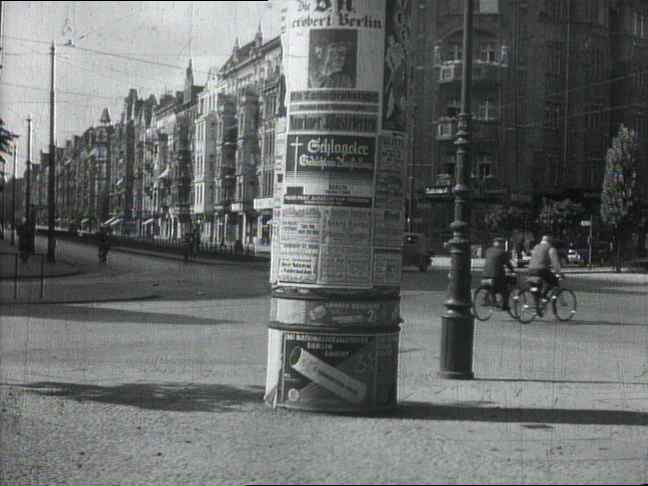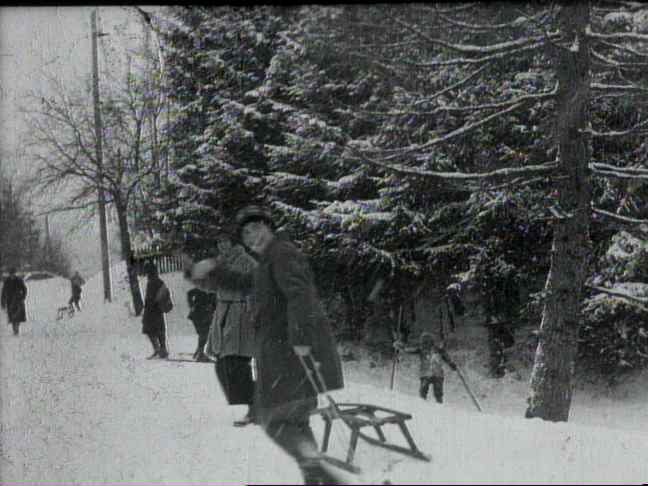Overview
- Description
- In 1939, Roman Vishniac was commissioned to make a promotional film at a Society for Trades and Agricultural Labor (ORT) vocational training facility near Marseille. The film was never completed, and only outtakes have survived. ORT schools throughout Europe worked to train and certify Jewish refugees in whichever skills were most desired by host countries. When French military mobilization reduced the available agricultural manpower, ORT refugees provided labor, and also eased the immersion of these foreign workers into French society.
ORT training activities. Group of men with suitcases walking through town streets. Group of men with farm equipment over their shoulders. CUs, men working in a greenhouse. LS, tilling soil in fields. EXT, farmhouse, men building window frames. Tilling soil and digging irrigation canals. MSs, men. Man pushes wheelbarrow with pipes for irrigation. Playing bocce. Digging maneur. 01:04:06 (some shots out of focus) INT, men enter classroom, sitting at desks using drawing tools. ECUs and MSs. More shots of men learning in classroom. Teacher at chalkboard. - Duration
- 00:06:48
- Date
-
Event:
1939
- Locale
-
Marseilles,
France
- Credit
- United States Holocaust Memorial Museum, courtesy of the Estate of Mara Vishniac Kohn
- Contributor
-
Camera Operator:
Roman Vishniac
- Biography
-
Born in Russia in 1897, Roman Vishniac was a biologist by training, having earned a doctorate in zoology and a medical degree from Moscow universities and a doctorate in Oriental art from the University of Berlin. For many years he was prevented from working in any of those fields because of war, revolution and political persecution. He instead pursued a career in microphotography, the photographing of insects, cells, plankton and other small organisms. His images in this area regularly appeared in Life magazine. From 1935 to 1938, Vishniac explored on foot the cities and villages of Eastern Europe, recording life in the Jewish shtetlekh (villages) of Germany, Poland, Romania, Hungary, Russia, Ukraine, Latvia and Lithuania, communities that even then seemed threatened by routine change as much as by violence and extermination. Using a hidden camera and working under difficult circumstances that included evading the police and also Nazis, he was able to take thousands of photographs. Before he finished the tour, he had been jailed eleven times and placed in a concentration camp in Vichy France. Roman Vishniac died in 1990.
Physical Details
- Language
- Silent
- Genre/Form
- Unedited.
- B&W / Color
- Black & White
- Image Quality
- Good
- Time Code
- 01:00:05:00 to 01:06:53:00
- Film Format
- Master
Master 2843 Film: negative - 16 mm - b&w - reversal original
Master 2843 Video: Digital Betacam - NTSC - large
Master 2843 Film: negative - 16 mm - b&w - reversal original
Master 2843 Video: Digital Betacam - NTSC - large
Master 2843 Film: negative - 16 mm - b&w - reversal original
Master 2843 Video: Digital Betacam - NTSC - large
Master 2843 Film: negative - 16 mm - b&w - reversal original
Master 2843 Video: Digital Betacam - NTSC - large- Preservation
Preservation 2843 Video: Betacam SP - NTSC - large
Preservation 2843 Film: negative - 16 mm - b&w - duplicate negative - A-wind - Kodak - 3234
Preservation 2843 Video: Betacam SP - NTSC - large
Preservation 2843 Film: negative - 16 mm - b&w - duplicate negative - A-wind - Kodak - 3234
Preservation 2843 Video: Betacam SP - NTSC - large
Preservation 2843 Film: negative - 16 mm - b&w - duplicate negative - A-wind - Kodak - 3234
Preservation 2843 Video: Betacam SP - NTSC - large
Preservation 2843 Film: negative - 16 mm - b&w - duplicate negative - A-wind - Kodak - 3234- User
User 2843 Film: positive - 16 mm - b&w - answer print - B-wind
User 2843 Film: positive - 16 mm - b&w - answer print - B-wind
User 2843 Film: positive - 16 mm - b&w - answer print - B-wind
User 2843 Film: positive - 16 mm - b&w - answer print - B-wind
Rights & Restrictions
- Conditions on Access
- This archival media can only be accessed in a Museum reading room or other on-campus viewing stations.
- Copyright
- The Magnes Collection of Jewish Art and Life, Mara Vishniac Kohn
- Conditions on Use
- All queries concerning the Vishniac Archive, including all rights and reproduction requests, should be directed to The Magnes Collection of Jewish Art and Life at the University of California at Berkeley, magnesrights@berkeley.edu.
- Copyright Holder
- The Magnes Collection of Jewish Art and Life
Mara Vishniac Kohn
Keywords & Subjects
Administrative Notes
- Legal Status
- Permanent Collection - not accessioned
- Film Provenance
- In 2008, the United States Holocaust Memorial Museum partnered with the International Center of Photography to study, preserve, and digitize Roman Vishniac's motion picture films. The Vishniac Archive was gifted to The Magnes Collection of Jewish Art and Life at the University of California at Berkeley in 2018.
- Note
- ORT stands for Obschestvo Remeslenovo i. Zemledelcheskovo Trouda [Society for Trades and Agricultural Labor]. Russian authorities started the group in 1880 to fund and assist Jewish trade schools and establish new colonies, agricultural schools and model farms in order to help lift Russia's five million Jews out of lives of crushing poverty. Today, ORT continues to train and educate Jews worldwide, provide them with the skills and knowledge necessary to cope with complexities and uncertainties of their environment, and foster economic self-sufficiency, mobility, and a sense of identity.
- Film Source
- The International Center of Photography
Mara Vishniac Kohn - File Number
- Legacy Database File: 4996
- Special Collection
-
Steven Spielberg Film and Video Archive
- Record last modified:
- 2024-02-21 08:05:54
- This page:
- https://collections.ushmm.org/search/catalog/irn1004152
Download & Licensing
- Request Copy
- See Rights and Restrictions
- Terms of Use
- This record is digitized but cannot be downloaded online.
In-Person Research
- Requires Research Visit
- Plan a Research Visit
Contact Us
Also in Roman Vishniac Collection
Roman Vishniac (1897-1990) was a biologist by training, having earned a doctorate in zoology and a medical degree from universities in Moscow and a doctorate in Oriental art from the University of Berlin. From 1935 to 1938, Vishniac explored on foot the cities and villages of Eastern Europe, recording life in the Jewish shtetls of Germany, Poland, Romania, Hungary, Russia, Ukraine, Latvia and Lithuania, communities that at that point in time seemed threatened by modernization as much as by violence and extermination. Using a hidden camera and working under difficult circumstances that included evading the police and the Nazis, he was able to take thousands of photographs. Before he finished the tour, he had been jailed eleven times and placed in a concentration camp in Vichy France. Vishniac also captured an original black and white film of ORT training activities in Marseilles, France in 1939. Scenes include men tilling soil in fields and holding drawing tools in a classroom. ORT stands for Obschestvo Remeslenovo i. Zemledelcheskovo Trouda [Society for Trades and Agricultural Labor]. Russian authorities started the group in 1880 to fund and assist Jewish trade schools and establish new colonies, agricultural schools and model farms in order to help lift Russia's five million Jews out of lives of crushing poverty. Today, ORT continues to train and educate Jews worldwide, provide them with the skills and knowledge necessary to cope with complexities and uncertainties of their environment, and foster economic self-sufficiency, mobility, and a sense of identity.

Edith Ernst on vacation
Film
Edith Ernst (later Vishniac) on a pier on a lake. Edith drinking beer by lake (the family on the pier behind her is not the Vishniac family). Edith in a canoe. Edith with a goat. Edith with a peacock. Edith laughing, leaning over balcony.

Vishniac children
Film
Two Vishniac children, Wolf (b. 1922) and baby Mara (b. 1926). Mara playing with rattle (the woman with the children is their nanny). Mara laying down. Mara in crib. Mara in crib with rattle.

Berlin street scene
Film
Berlin street scenes with posters affixed to a pillar; bicycles (very brief). Probably Charlottenburg district where the Vishniac family lived on Pariserstrasse.

Vishniac family in the snow
Film
Luta Bagg Vishniac (first wife of Roman Vishniac, mother of Mara and Wolf Vishniac) wearing a thick winter coat in the snow, pulling a sled (the other women in the background and waving cannot be identified - possibly the children's nanny or Luta's sisters). Luta sledding down the hill, facing the camera. Roman Vishniac sledding down the hill, he tosses up his hat and playfully catches it, facing the camera.




